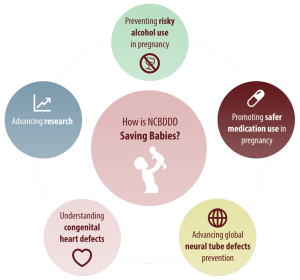AAGF and Kayte Thomas are featured in the “Spotlight” of NCBDDD’s 2014 Annual Report
Saving Babies Through Birth Defects Research and Prevention Annual Report 2014
CDC’s National Center on Birth Defects and Developmental Disabilities (NCBDDD) made notable progress in its mission to prevent birth defects in 2014.
Every 4 ½ minutes, a baby is born with a major birth defect in the United States. That’s 1 in 33 babies. Birth defects are structural changes in one or more parts of the body that are present at birth. NCBDDD identifies causes of birth defects, finds opportunities to prevent them, and improves the health of those living with birth defects.
By applying a public health approach incorporating three essential elements—surveillance or disease tracking, research to identify causes, and prevention research and programs—we can rapidly translate scientific findings into appropriate public health interventions.
Accomplishments
Began the next generation of birth defects prevention research with BD-STEPS. Funded six research centers across the United States to collaborate and collect data, starting with children born in 2014. Results will offer more knowledge about modifiable factors that might raise or lower the risk of having a baby with a birth defect.
Collaborated with federal and external partners to develop a national strategy to improve the health of mothers and babies through better research, reliable guidance, and informed decisions related to safer medication use in pregnancy. Launched a new Treating for Two website which provides valuable resources for women, families, and health professionals and developed an infographic to educate policymakers and partners. Additionally, initiated multiple projects to address knowledge about prenatal exposure to opioids and other commonly used medications.
Advanced global neural tube defects prevention efforts through Birth Defects COUNT. Collaborated with the World Health Organization and International Clearinghouse for Birth Defects Surveillance and Research to develop birth defects surveillance tools for low-and middle-resource countries. Supported development of country-level birth defects monitoring and prevention strategies in South-East Asia and formed a collaboration to implement a demonstration project to assess folic acid fortification feasibility, sustainability, and health impact in India.
Achieved significant milestones in our project to estimate the prevalence and understand the health issues of adolescents and adults born with a heart defect, including collecting data and finalizing a plan for analysis.
Released unique data and created new tools to prevent risky alcohol use for all adults, including pregnant women.
Contributed to a CDC Vital Signs report highlighting alcohol screening and brief intervention (SBI) as an effective but underused health service. Addressed this gap with a guideto help primary care practices implement alcohol SBI as a routine part of health care. Also released new, research-based materials to prevent fetal alcohol spectrum disorders.
Looking to the Future
Our ongoing state-based birth defects tracking system and public health research continue to form the scientific foundation for preventing birth defects and helping people thrive throughout their lives. Further strengthening this foundation through enhanced tracking would allow better understanding of the causes of birth defects and the lifelong implications on cost and quality of life. Similarly, our prevention programs seek to translate this knowledge into actionable health promotion programs that change people’s lives. Our public health programs continue to show promise and potential to expand and help millions of Americans live healthier lives.
Spotlight On: National Birth Defects Prevention Network Parent Advisory Group
“When my daughter was born with multiple birth defects, I was scared. I had no idea what challenges she would face. Ashley was born in 2005 with gastroschisis – which meant her intestines protruded from her abdomen and required immediate, life-saving interventions; microtia/atresia – which has left her permanently hearing impaired; and velopharyngeal insufficiency secondary to submucosal cleft – leaving her with a speech impediment. Additionally, she suffers from sensory issues thought to be from her NICU stay. Today, my daughter is 9 years old and is a wondrous testimony to the vibrancy of life. She plays piano, reads voraciously, runs track for the city team, dances ballet/jazz/hip-hop, and engages in regular social justice and community service activities. She is an everyday miracle.
Throughout her lifetime, I have reached out to other families to provide support and have assisted in founding the first nonprofit in the United States for gastroschisis, Avery’s Angels Gastroschisis Foundation. In 2011, I became part of the National Birth Defects Prevention Network Parent Advisory Group. Our group started with five parent advocates and our goal was to raise public awareness about birth defects. We created a public service announcement that aired nationally and internationally, assisted the CDC with prevention efforts, and published a peer-reviewed journal article that has been internationally cited. We received a national award for our advocacy efforts. Currently, we are focused on building a non-partisan, parent-driven advocacy group aimed at impacting public policy for those affected by birth defects. Being a part of this group means that I am able to create far-reaching impact from my own experience, and it is my hope that one day everyone in the United States will realize how important it is to fund birth defects surveillance, monitoring, and prevention programs to ensure the health of our children and future generations.”
– Kayte Thomas

